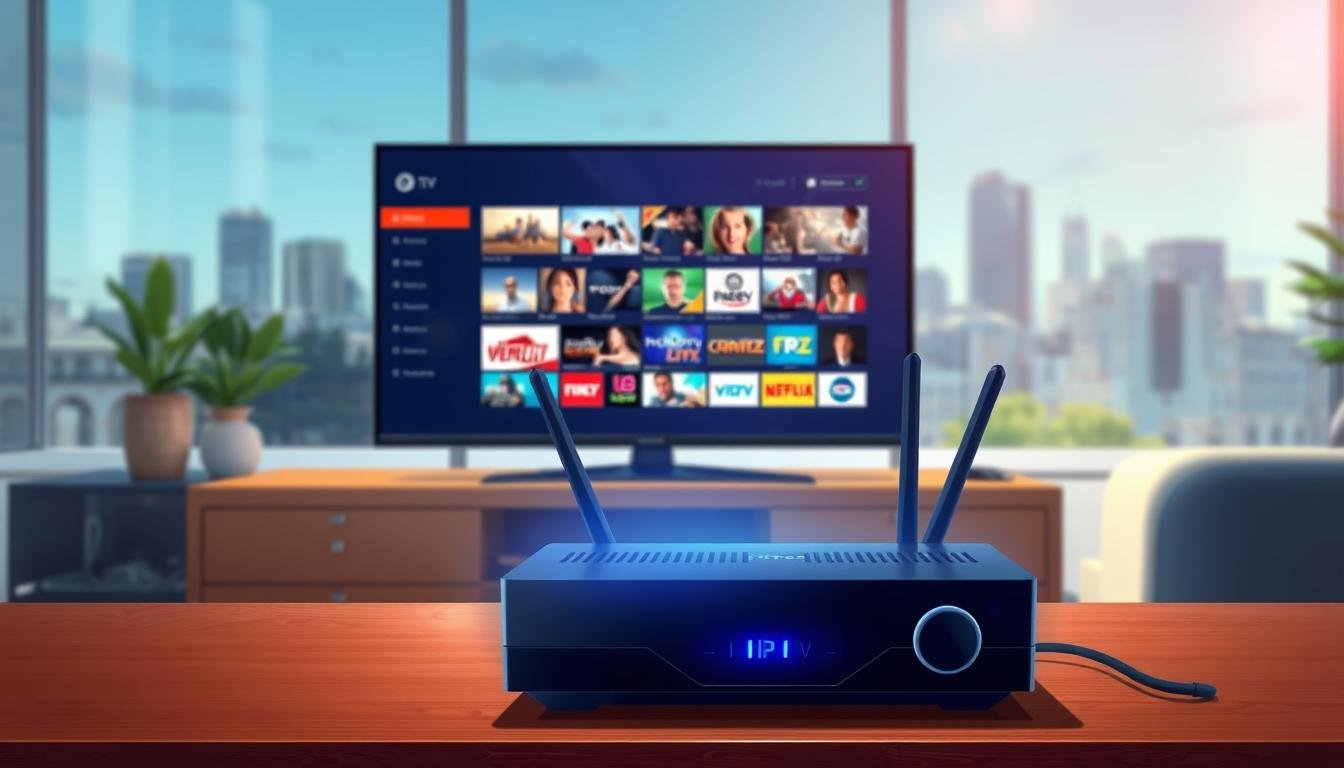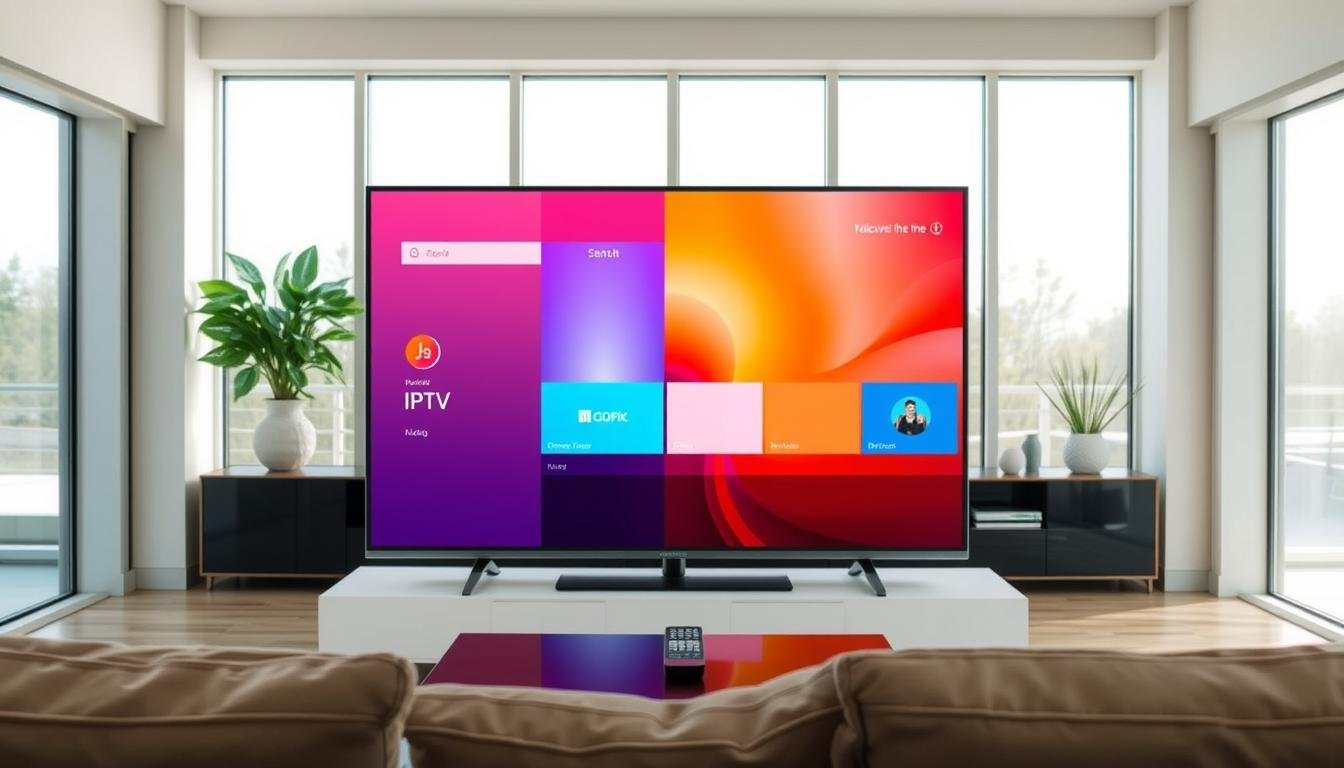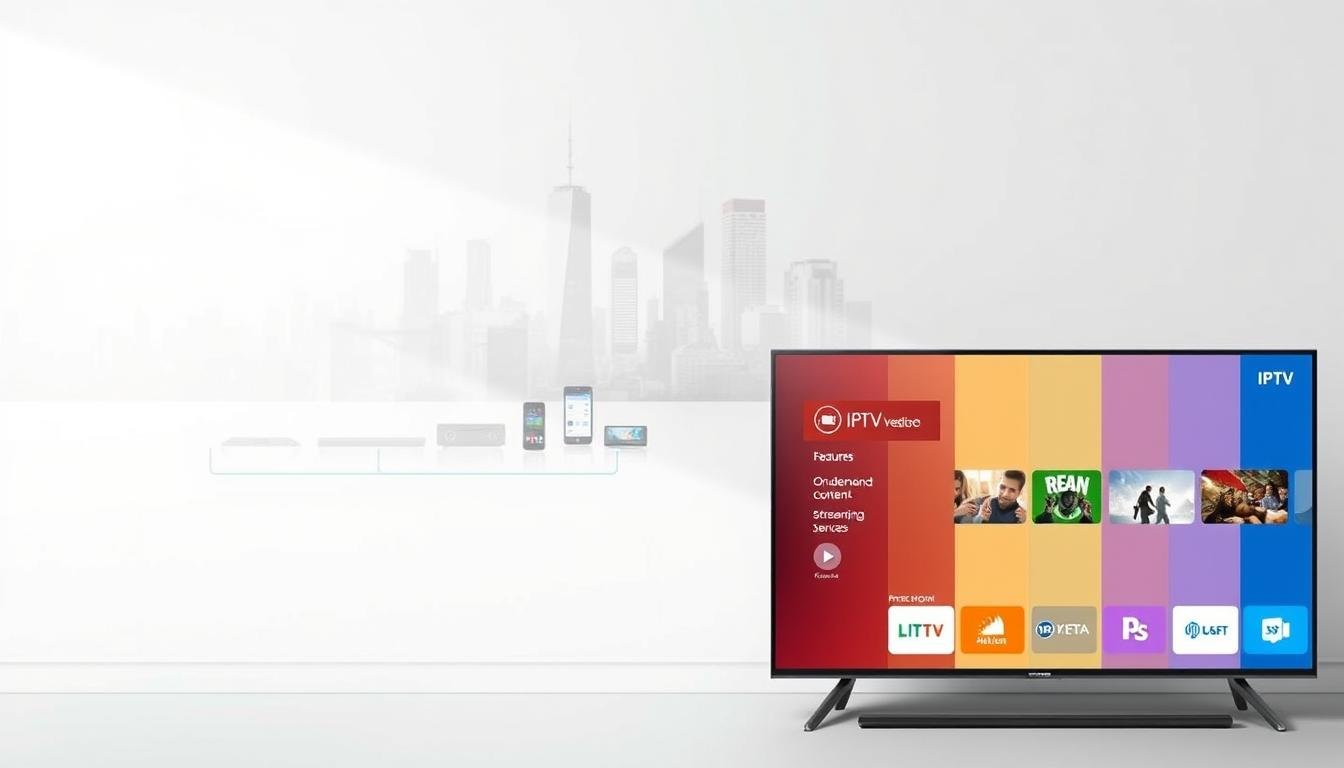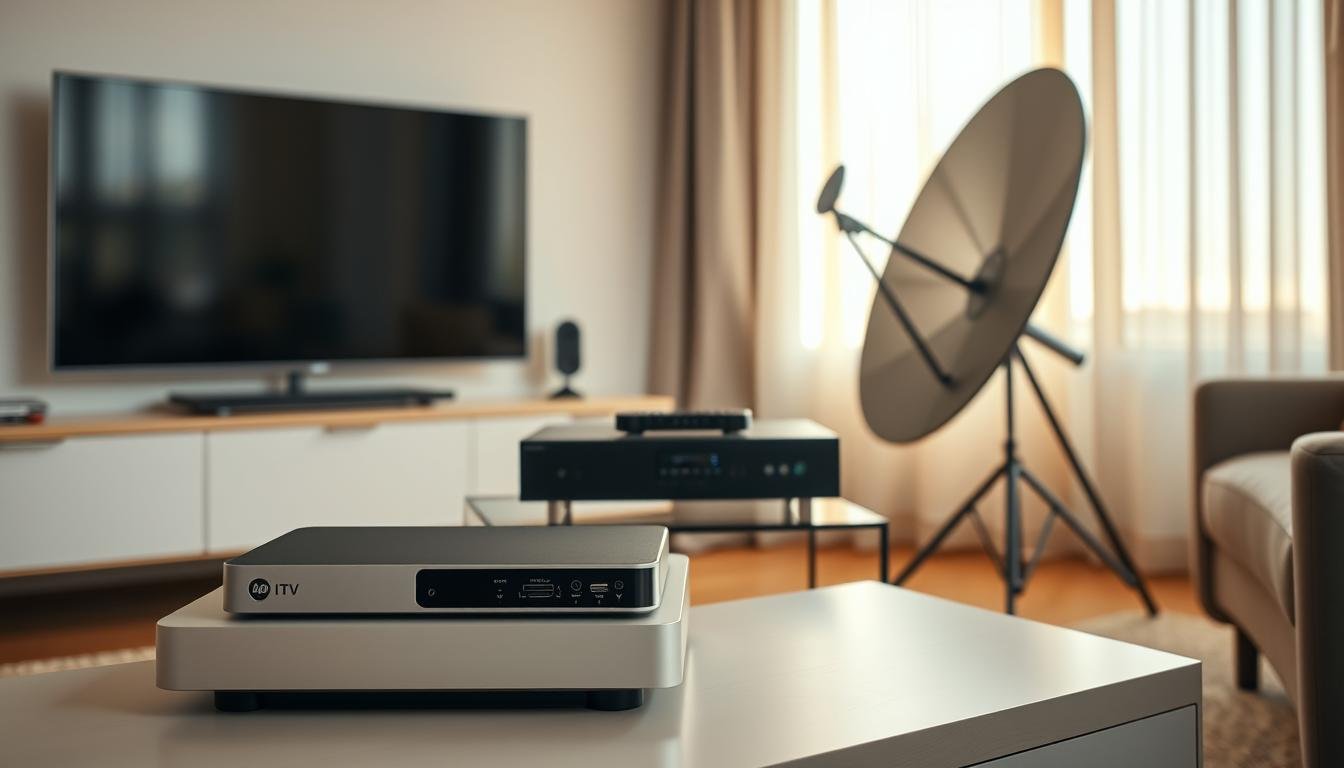What is IPTV and How Does It Work? – Explained
Internet protocol television, or IPTV, is a way to watch TV over the internet. It lets users pick from many channels and watch shows whenever they want. This makes it a great choice over traditional TV.
IPTV has changed how we watch TV. It lets us see live TV, movies, and more whenever we want. All you need is a good internet connection. This makes watching TV flexible and easy.
Key Takeaways
- Internet protocol television, or what is iptv, is a system that delivers television content over internet protocol networks.
- Iptv services offer a wide range of channels and content on demand, making it a popular alternative to traditional television.
- Understanding what is iptv, and how does it work, is essential to appreciating the benefits of internet protocol television.
- Iptv services provide a more flexible and convenient viewing experience, allowing users to access content from any location.
- The technology behind iptv services enables the delivery of high-quality video content over the internet.
- Internet protocol television has revolutionized the way we consume television content, offering a more personalized and interactive viewing experience.
Understanding IPTV: The Future of Television
IPTV technology is changing how we watch TV, making it more personal and interactive. With IPTV providers, you can watch live TV, movies, and sports at home. The iptv set-top box is key, letting you stream content to your TV.
IPTV offers better video and audio quality than traditional TV. It also has cool features like video on demand, pausing live TV, and recording shows. This makes it great for those who like to control their viewing.
Some of the key advantages of IPTV include:
- High-quality video and audio
- Personalized viewing experience
- Access to a wide range of channels and content
- Ability to pause and rewind live TV
- Video on demand
IPTV is transforming TV watching, offering a more interactive and personal experience. With the right iptv set-top box and IPTV provider, you can enjoy a wide range of content and a better viewing experience.
What is IPTV and How Does It Work?
IPTV, or Internet Protocol Television, is a new way to watch TV shows and channels on your devices. With iptv streaming, you can see sports, movies, and TV shows from anywhere. It’s a global service.
The iptv streaming process is easy. It sends video over the internet using a fast connection. This lets you watch live TV, on-demand shows, and even interactive services.
Some great things about iptv streaming are:
- Access to lots of channels and content
- Streaming to many devices, like TVs, computers, and phones
- Interactive features, like video on demand and interactive TV
- High-quality video and sound, with little buffering
In summary, iptv streaming makes watching TV easy and flexible. With many iptv channels to choose from, you can find sports, movies, and TV shows to enjoy.
First, let’s learn about IPTV services and how they work. IPTV, or Internet Protocol Television, lets you watch TV shows and movies online. With an IPTV subscription, you get access to many channels and content worldwide.
To set up IPTV, you need a few things. You’ll need fast internet, a smart TV or set-top box, and an IPTV provider subscription. Picking the right IPTV provider is key. It affects the service quality and channel variety. Many providers offer a free trial to try before you buy.
Key Features of IPTV Services
- High-definition video quality
- Access to a wide range of channels and content
- Ability to record and playback shows
- Support for multiple devices, including smart TVs, smartphones, and tablets
There are different IPTV subscription plans, like monthly or yearly. Some providers have a free trial or a one-time payment option. When choosing, think about the channels, service quality, and customer support. The right IPTV services and subscription make for a great viewing experience.
Conclusion: The Impact of IPTV on Modern Entertainment
IPTV (Internet Protocol Television) has changed how we watch entertainment. It has made TV better by giving us more choices and flexibility. Now, we can watch what we want, when we want, thanks to IPTV technology.
The IPTV change has also affected the TV industry a lot. It lets viewers control their TV watching. They can pause, rewind, and record shows live. This makes watching TV more fun and personal than ever before.
FAQ
What is IPTV and how does it work?
IPTV stands for Internet Protocol Television. It delivers TV content over the internet. Unlike traditional TV, IPTV streams shows directly to your device via the internet. It uses the internet protocol (IP) network to send digital video signals.
This allows users to watch TV channels, movies, and more on various devices.
What are the benefits of IPTV services?
IPTV has many advantages over traditional TV. Here are a few:
– Flexibility: You can watch TV on smart TVs, computers, tablets, and smartphones.
– On-demand content: IPTV offers a wide range of movies, TV shows, and more.
– Personalization: IPTV services often suggest content based on your preferences.
– Enhanced user experience: IPTV provides a user-friendly interface with features like pause and rewind.
What equipment do I need to set up IPTV?
To start with IPTV, you’ll need a few things:
– A high-speed internet connection: This is crucial for streaming video content.
– An IPTV set-top box or smart TV: This device connects to your TV and accesses the IPTV service.
– A compatible device: You can also use smartphones, tablets, and computers to access IPTV.
– A subscription to an IPTV service provider: You’ll need to pay for a subscription to access content.
How do I choose the right IPTV provider?
When picking an IPTV provider, consider these factors:
– Channel selection: Choose a provider that offers the channels you want.
– Pricing and subscription plans: Look for plans that fit your budget and needs.
– Device compatibility: Make sure the provider supports your devices.
– Reliability and performance: Check customer reviews to see how reliable the service is.
– Additional features: Consider features like DVR functionality or multi-screen viewing.
How do IPTV subscriptions work?
IPTV subscriptions work like this:
– You sign up for a provider and choose a plan that suits you.
– The provider gives you login credentials or a set-top box to access the service.
– You can then stream live TV, on-demand content, and more on your device.
– Subscriptions are usually billed monthly or annually, depending on the provider and plan.
- IPTV uses the internet to deliver TV channels and content.
- It has a two-way communication system for more interactive features and on-demand content.
- It offers a wider range of channels and content, including niche and international ones.
- It has more flexible pricing options, like subscription-based models and pay-per-view.
IPTV is a great choice for those who want a more interactive and personalized TV experience. Knowing the differences between IPTV and cable/satellite TV helps viewers choose the best option for them.
Service Delivery and User Experience
iPTV offers more personalized and interactive services than cable or satellite TV. Users can enjoy on-demand content and high-definition channels. They can also interact with their viewing experience in new ways.
One big advantage of iPTV is watching content on multiple devices. This includes smartphones, tablets, and smart TVs. This flexibility is a key reason many choose iPTV over traditional TV services.
The user experience of iPTV is also more user-friendly. It comes with personalized recommendations and easy navigation. This makes finding and watching favorite shows and movies much simpler.
Additionally, iPTV offers a flexible viewing experience. Users can pause, rewind, and fast-forward content as they like. This adds to the convenience and enjoyment of watching TV.
iPTV is also more reliable than traditional TV services. It uses a stable internet connection to deliver content. This means fewer outages and signal losses, providing a better viewing experience.
In summary, iPTV’s personalized features, interactive functionality, and reliable service make it a top choice. It offers a better viewing experience for those looking for something more than traditional TV.
Cost Structure and Subscription Models
When looking at IPTV, cable, and satellite TV, it’s key to check their costs and subscription models. IPTV vs cable vs satellite TV is a big deal for your entertainment budget. The main differences are in technology and pricing.
IPTV offers flexible pricing and no long-term contracts. This makes it great for trying out different services without being stuck. Cable and satellite TV, on the other hand, have stricter pricing and long-term contracts. This can be a problem for some users.
When comparing costs, consider these factors:
- Pricing plans and packages
- Equipment fees and rental costs
- Installation costs and setup fees
- Hidden costs and additional charges
Knowing the costs and subscription models helps you choose wisely. Whether you want flexible pricing or a traditional contract, there’s something for everyone. You can find entertainment that fits your budget.
Conclusion: Making the Right Choice for Your Entertainment Needs
When comparing IPTV to traditional TV, it’s clear IPTV is the future. IPTV offers many benefits, like flexibility and cost savings. Knowing the key differences helps you choose what’s best for you.
Choosing between IPTV and traditional TV depends on your needs. Think about what you want to watch, the quality, and how easy it is to use. The right choice can make your viewing experience better.
The move to IPTV is a big change in how we watch TV. Keeping up with technology helps you enjoy the best entertainment. It keeps you ahead of the latest trends.
FAQ
How is IPTV different from cable or satellite TV?
IPTV and cable/satellite TV differ in how they deliver content. IPTV uses the internet to send TV channels and on-demand content. Cable and satellite TV use older broadcasting methods.
What are the technical distinctions between IPTV, cable, and satellite TV?
IPTV has a two-way system, which means it’s more interactive and offers on-demand content. Cable and satellite TV have a one-way system, offering less interactivity.
How does the service delivery and user experience differ between IPTV and cable/satellite TV?
IPTV gives a more personalized viewing experience. It includes on-demand content, high-definition channels, and the ability to watch on various devices. Cable and satellite TV offer a more traditional, linear channel-based experience.
How do the cost structures and subscription models compare between IPTV and cable/satellite TV?
IPTV providers often have more flexible pricing and no long-term contracts. Cable and satellite TV providers may have stricter pricing and require long-term commitments. IPTV also tends to have fewer hidden costs or equipment fees.
What are the key advantages of choosing IPTV over cable or satellite TV?
Choosing IPTV means getting a more personalized and interactive viewing experience. You can access on-demand content and enjoy more affordable, flexible pricing compared to traditional TV options.




